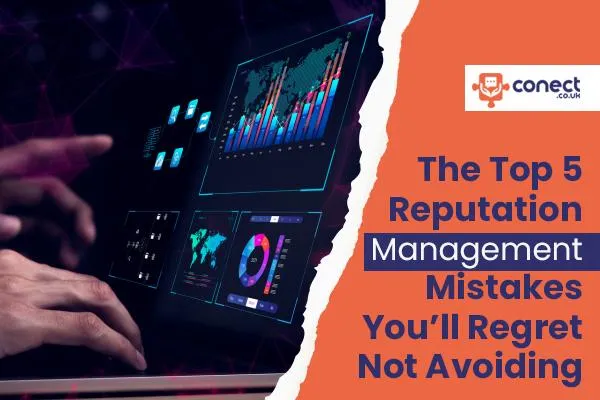
Best Reputation Management Tips to Grow Your Business
The Top 5 Reputation Management Mistakes You’ll Regret Not Avoiding
When it comes to business growth, reputation is everything. The way your brand is perceived by customers can make or break your success. With the rise of online reviews and social media, managing your reputation is more important than ever. However, many businesses still make crucial mistakes that can hurt their image. By understanding the common pitfalls and how to avoid them, you can protect your brand and ensure lasting success.
This article will explore the top 5 reputation management mistakes that businesses often make and provide practical advice on how to avoid them. By the end of this post, you’ll have the tools and knowledge to safeguard your brand’s online presence and maintain a positive reputation.
Mistake 1: Ignoring Negative Reviews
One of the most common mistakes in reputation management is ignoring negative reviews. When a dissatisfied customer posts a bad review online, some businesses choose to overlook it or hope it will go away. Unfortunately, ignoring negative feedback can be detrimental to your brand.
Why You Should Respond to Negative Reviews
Ignoring negative reviews creates a sense of disengagement with your customers. It sends the message that you don’t care about their concerns. In the long run, this will erode trust and cause potential customers to think twice before engaging with your business.
On the other hand, addressing negative reviews with professionalism and empathy shows that you care about customer satisfaction. It can even turn a negative experience into a positive one by demonstrating your commitment to improving your products or services.
What to Do Instead:
Respond quickly: Acknowledge the issue promptly and assure the customer that you’re working to resolve it.
Stay professional: Always keep your response respectful, even if the review is harsh.
Offer solutions: If appropriate, provide a solution or ask for more information to resolve the problem.
By handling negative reviews appropriately, you show other potential customers that you are reliable and committed to providing top-notch service.
Mistake 2: Failing to Monitor Your Online Presence
It’s easy to forget about your online reputation when things are going well. However, one of the biggest mistakes a business can make is failing to regularly monitor its online presence. Whether it’s reviews on Google, comments on social media, or mentions in news articles, it’s essential to keep track of how your brand is being talked about online.
Why Monitoring Is Critical
The internet moves fast, and opinions can change in an instant. If you aren’t monitoring your online presence, you risk missing out on important feedback, both positive and negative. Additionally, you may not notice issues before they escalate into bigger problems.
What to Do Instead:
Set up alerts: Use tools like Google Alerts to monitor mentions of your business across the web.
Check reviews regularly: Make it a habit to review customer feedback on all major platforms.
Engage with followers: Respond to comments and messages on social media to show that you care about customer engagement.
Regular monitoring allows you to stay on top of your brand’s image and quickly address any issues that arise.
Mistake 3: Not Encouraging Positive Reviews
Many businesses focus only on managing negative reviews but fail to encourage satisfied customers to share their experiences. Positive reviews are just as important as negative ones and play a significant role in building a strong reputation.
Why Positive Reviews Matter
When potential customers see glowing reviews from others, they are more likely to trust your brand. Positive feedback can improve your search engine rankings and give your business more visibility. It also helps to balance out any negative reviews you may receive.
What to Do Instead:
Ask for reviews: After providing excellent service, ask happy customers to leave reviews on your website or review platforms.
Make it easy: Provide direct links to review sites to streamline the process.
Show appreciation: Always thank customers for their positive feedback to build goodwill.
Encouraging positive reviews should be part of your regular reputation management strategy.
Mistake 4: Not Having a Crisis Management Plan
Reputation crises can happen at any time, whether it's a product recall, a PR blunder, or a customer service failure. If your business doesn’t have a plan in place to handle these situations, it can quickly spiral out of control.
Why You Need a Crisis Management Plan
In today’s fast-paced world, news spreads quickly, especially when it’s negative. A lack of preparedness can lead to an ineffective response that damages your reputation even further. A crisis management plan helps you react quickly and efficiently to protect your brand.
What to Do Instead:
Create a strategy: Outline a plan that includes communication protocols, key personnel, and steps to address the issue.
Be transparent: If something goes wrong, be open and honest about what happened and what you are doing to fix it.
Act quickly: Don’t wait too long to address a crisis, as the longer you delay, the worse it may become.
Having a crisis management plan in place ensures that you can respond to negative events quickly and efficiently, minimizing potential damage to your brand’s reputation.
Mistake 5: Failing to Invest in Reputation Management Tools
Reputation management tools are essential for businesses that want to stay on top of their online presence. These tools provide valuable insights into customer sentiment, track reviews, and help you respond to feedback more efficiently. Failing to invest in these tools is a mistake that could leave your business vulnerable to reputational damage.
Why Are Reputation Management Tools Necessary?
The tools allow you to keep track of what’s being said about your brand in real-time. They offer features like sentiment analysis, automated review monitoring, and the ability to engage with customers directly. Without these tools, you may miss valuable opportunities to improve your reputation or address issues before they escalate.
What to Do Instead:
Invest in the right tools: Research and invest in reputation monitoring software that fits your business needs.
Track reviews and mentions: Use tools to keep an eye on customer feedback across multiple platforms.
Automate responses: Many tools allow you to automate responses to common reviews, saving time and effort.
With the right tools in place, you can stay ahead of potential problems and ensure that your reputation remains strong.
Final Thoughts
Your reputation is an invaluable asset to your business. Avoiding these common mistakes can help you protect and grow your brand's image, build stronger relationships with customers, and improve your overall success.
By addressing negative reviews, monitoring your online presence, encouraging positive feedback, preparing for crises, and investing in reputation management tools, you can ensure your business thrives. Don’t wait until a crisis hits—start implementing a solid reputation monitoring strategy today!
FAQs
1. What is online brand monitoring?
Online brand monitoring involves tracking and improving how your business is perceived across digital platforms.
2. Why is it important to protect my brand’s image?
A strong brand image helps build trust, attract customers, and foster business growth, while a negative image can hurt sales and credibility.
3. How can bad reviews impact my business?
Negative reviews can damage customer trust and potentially drive new customers away, leading to lower sales and brand damage.
4. What happens if I ignore my brand’s online presence?
Ignoring your online presence can result in loss of customer trust, reduced sales, and long-term harm to your business’s growth.
5. How can I prevent online issues from getting worse?
Regularly monitor feedback, address complaints quickly, and take proactive steps to maintain a positive online presence.
6. Should I respond to negative customer reviews?
Yes, responding to negative reviews shows customers that you value their feedback and are committed to making improvements.
7. How often should I check my business’s online reputation?
Regularly monitoring your online presence is essential, ideally on a weekly basis, to keep track of customer sentiments.
8. Can my business recover after serious reputation damage?
Yes, recovery is possible with consistent effort, strategic actions, and time to rebuild trust and improve your online image.
9. How can social media affect my brand’s perception?
Social media plays a major role in shaping public opinion; managing posts and engaging with feedback is crucial for maintaining a positive image.
10. What role do customer reviews play in shaping my business’s image?
Customer reviews act as social proof, highlighting the quality of your product or service and balancing out any negative feedback to strengthen your reputation.

The All-In-One Solution to grow your business. Capture Free Leads And Conversationally Covert Them Into Customers!
Contact information
Address : Layton Lane, Rawdon, Leeds, LS19 6RG
Phone : +44 7859 775480
Email : [email protected]

